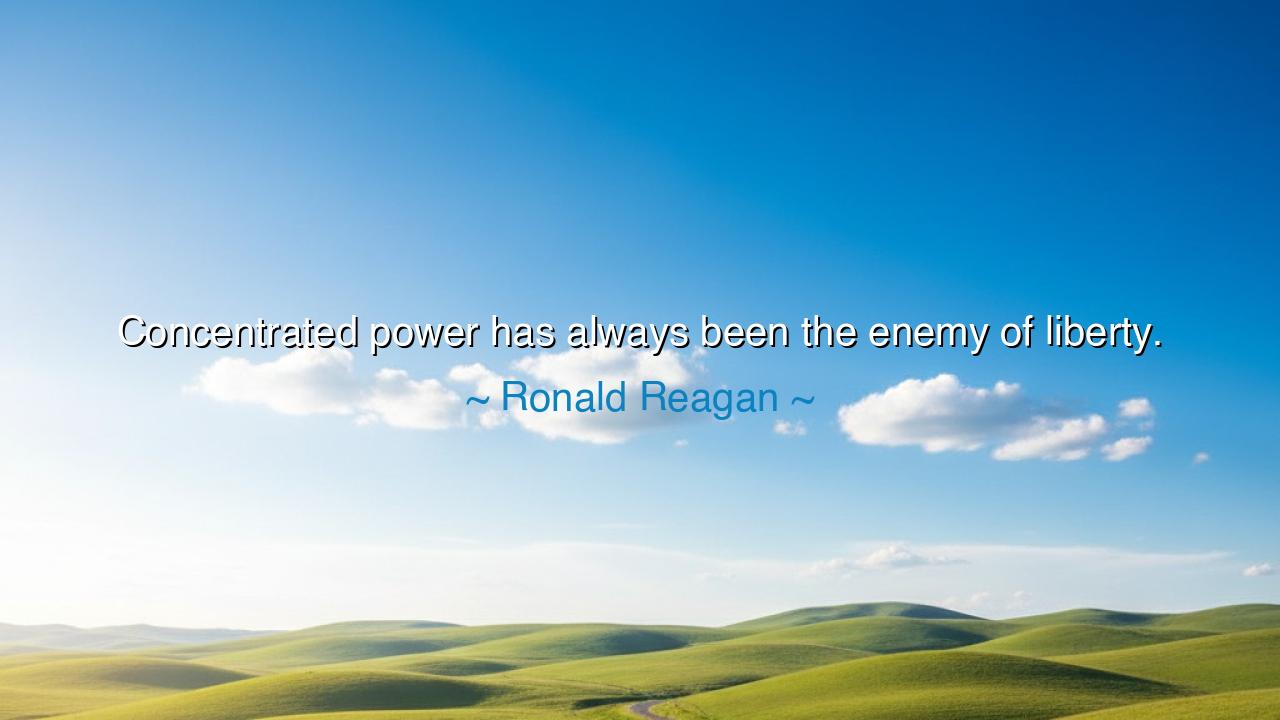
Concentrated power has always been the enemy of liberty.






In these timeless words, Ronald Reagan warns of a danger that has stalked humanity since the dawn of civilization. Concentrated power is like a raging river held back by a fragile dam. At first, it may seem to bring order and strength, but when it gathers too greatly, it overwhelms its bounds and sweeps away all in its path. Liberty, the sacred freedom of individuals to live and speak without fear, is fragile like a flame in the wind. When power rests in the hands of a few, it seeks to snuff out that flame, for absolute authority can never abide the voices of the free.
The origin of this idea lies deep within the struggles of history. Reagan, as a leader of a great nation, understood the lessons of empires past. Ancient Rome, once a proud republic of shared rule, fell when power became centralized in the hands of emperors. What began as the voice of the people turned into the commands of one man, and with this shift, liberty was lost, and tyranny rose. Reagan’s words echo not just modern politics, but the ancient cry for balance and justice.
Consider the rise of Adolf Hitler and the Nazi regime. A broken and desperate Germany yielded more and more power to a single figure who promised salvation. This concentration of power allowed evil to grow unchecked, leading to war, genocide, and the near destruction of the world. Had power been more widely shared and challenged, the tide of darkness might have been turned before it drowned millions. This tragic lesson remains a stark reminder of why liberty must always be protected by dispersing authority.
Reagan’s warning is not only about governments but about the human heart. For when power is concentrated, even with noble intentions, corruption follows. Like a tree struck by lightning, the core of freedom rots when no one dares to question or restrain those who rule. It is the responsibility of the people to guard against this, for liberty is not a gift, but a living force that must be defended through vigilance, courage, and sacrifice.
In every age, there are those who would gather power to themselves, whispering promises of safety or prosperity. Yet as Reagan’s words teach, these promises are but chains in disguise. The people of today, and of all future generations, must remember this sacred truth: when many hands hold the reins of power, freedom thrives; when a few clutch them tightly, tyranny rises. Let this wisdom be carried forward, like a beacon, to guide nations through the tempests of history.






NHKhang Nguyen Hoang
Reagan's warning about concentrated power is as relevant today as it was in the past. When too much control is held by a small group, it often leads to the oppression of others. This highlights the importance of maintaining transparency, accountability, and the protection of individual rights. How do we keep our political systems from allowing too much concentration of power without creating instability? What safeguards should be put in place to prevent such abuses?
KTNguyen Thi kim thu
I agree with Reagan’s sentiment that concentrated power often leads to the loss of individual freedoms. It’s a reminder of why democratic systems and the separation of powers are so important. But I also wonder, in a modern context, can too much decentralization create inefficiency? How do we ensure that while power is spread out, it doesn’t become too fragmented to address pressing issues effectively? How do we find that middle ground?
DHDang Hai
Reagan's quote makes a strong point about how centralized power poses a direct threat to liberty. It’s not hard to find examples of dictatorships and oppressive regimes where power was consolidated, leading to the suppression of freedoms. But in a world where complex global issues demand strong leadership, is there a way to prevent power from becoming too concentrated? How do we ensure that liberty is always protected while still addressing these larger challenges?
TNLe Thi Na
This quote by Reagan brings to light an essential issue: the fragility of liberty when power is too centralized. Throughout history, we've seen how concentrated power often leads to authoritarianism. It’s a compelling argument for the importance of decentralizing power to protect individual freedoms. But in modern societies, where is the line between necessary governmental control and dangerous concentration of power? How do we prevent power from overstepping without compromising security?
TLThao Le
Ronald Reagan's statement resonates with a lot of historical and contemporary examples. When power becomes too concentrated, it can easily be abused, which often leads to the erosion of individual freedoms. It's a strong argument for maintaining checks and balances in government. But, in today's world, can we really prevent the concentration of power in the hands of a few? How can we strike the right balance between authority and liberty?